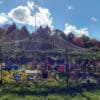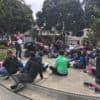It’s August in Vermont’s Mad River Valley. Youth scatter themselves across the covered bridge of Waitsfield and fly into the river below. A family floats by in their tube and a band plays by the river’s edge. Our fields are growing high with corn, squash, and beans. The edges of the meadow and the perennial beds sprout color as they ripen with blackberries, raspberries, blueberries, and thimbleberries. We gather on the porch of the Oshkello’s net-zero house to plan for our regional Sukkot festival while the owls come out at dusk. On the table, there is basil to be made into pesto and broccoli to be frozen for the winter. The sheep and chickens raise their voice in blessing for this beautiful summer day. We recite the Shehecheyanu prayer as we eat the first cucumbers of the season. Welcome to life at Living Tree Alliance! Our land consists of 93 acres of farmland, meadows, forest, trails, a working maple sugarbush, and private swimming beaches along the Mad River. The property adjoins the running and skiing trails of the local high school which includes an amazing forest frisbee golf course. We steward this land with a vision of community and hope […]






